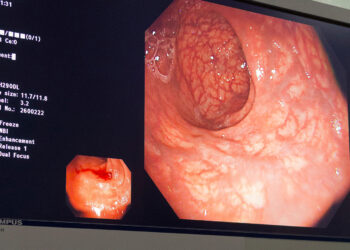Children who respond well to pediatric obesity treatment have markedly lower morbidity and mortality risks in young adulthood, according to data published on January 21 in JAMA Pediatrics.
Researchers, led by Resthie R. Putri, PhD, with the Division of Pediatrics, Department of Clinical Science, Intervention and Technology at the Karolinska Institutet in Stockholm, Sweden, collected data from a prospective cohort of 6,713 children and adolescents with obesity within the Swedish Childhood Obesity Treatment Register (BORIS) and general population comparators from national registers. They used baseline data between 1996 and 2019 and conducted formal analyses in 2023.
Outcomes were assessed for young adults aged 18-30 years (2005-2020). Participants included children and adolescents aged 6-17 years who received at least 1 year of obesity treatment. General population comparators, who fell outside of treatment criteria, were matched using a ratio of 1:5 on sex, year of birth, and geographical area.
The team categorized pediatric obesity treatment response, based on changes in body mass index standard deviation score, as poor, intermediate, good, or obesity remission. Young adult outcomes studied were type 2 diabetes, dyslipidemia, hypertension, depression or anxiety, and weight-loss bariatric surgery.
Best Response Groups Had Largest Drop in Health Risks
The researchers found that compared with poor response, obesity remission or a good response in obesity treatment was associated with sharply reduced risk for mortality (adjusted hazard ratio [HR], 0.12; 95% CI, 0.03-0.46). Good response was also associated with lower risk for type 2 diabetes (HR, 0.42; 95% CI, 0.23-0.77); dyslipidemia (HR, 0.31; 95% CI, 0.13-0.75); and bariatric surgery (HR, 0.42; 95% CI, 0.30-0.58). Obesity remission showed a similar lower risk and was the only category to show a reduced risk for hypertension (HR, 0.40; 95% CI, 0.24-0.65).
Obesity treatment response was not linked with depression or anxiety in young adulthood and that’s an important finding, the authors noted, because “this suggests that although these conditions coexist, there is a need for independent treatment of each condition.”
“The effect of pediatric obesity treatment effectiveness on adult risk of depression or anxiety in large cohorts has not previously been evaluated,” the authors wrote.
A strength of this large study is that mandatory participation in Sweden’s registers allowed for consistent tracking from childhood to adulthood with minimal loss to follow-up. Universal coverage also adds good internal validity and national generalizability. However, generalizability to other countries is unknown.
‘A Very Strong Study’
In an accompanying commentary, editorialists, led by Leonard H. Epstein, PhD, with the Department of Pediatrics, Jacobs School of Medicine and Biomedical Sciences, University at Buffalo, in New York City, discussed the study’s strengths, limitations and impact.
“This is a very strong study whose data may inform the amount of relative weight change needed to incur clinically meaningful benefits, which could inform guidelines for evaluating treatment outcome studies,” they wrote.
However, treatment type and intensity for the Swedish children was not provided in this study, which makes it challenging to compare with the American Academy of Pediatrics (AAP) guidelines, they noted. The AAP recommends 26 sessions of intensive behavioral and lifestyle treatment implemented over a 3- to 12-month period.
The editorial pointed out that the percentage of children aged 6 years to younger than 12 years who achieved good response or remission is 48.1% whereas 29.1% of children 12-17 years of age achieved these goals. The percentages reverse when considering poor response, where 21.6% of 12- to 17-year-old youth fell into that category, whereas 14.7% of 6- to younger than 12-year-old children showed a poor response.
Obesity Treatment Early, Rather Than Waiting?
The editorialists wrote that this suggests it may be easier to reach significant change in preadolescence than in adolescence and obesity treatment should be initiated as early as possible “rather than (waiting) to see if they outgrow their obesity.”
The editorialists wrote that ideally the data on anxiety and depression compared with treatment response should have been presented separately, as anxiety and depression are different concerns.
Nevertheless, this work suggests that “parents and interventionists should not rely on weight change as a long-term treatment approach for youth who have comorbid obesity and anxiety/depression,” Epstein and colleagues wrote.
“In summary,” they wrote, “this is a valuable article that demonstrates for the first time, to our knowledge, the impact of pediatric treatment for obesity on young adult cardiometabolic disease, bariatric surgery, and mortality. These data will be useful to consider criteria for clinical effectiveness of treatment, as well as pointing out limitations in our current approaches to treatment of pediatric obesity.”
This study was sponsored by Novo Nordisk A/S. Funding sources who supported the register linkage included the Åke Wiberg Foundation and the Ollie and Elof Ericsson’s Foundation.
Putri and Pernilla Danielsson, PhD, reported receiving research and medical writing assistance from Novo Nordisk during the conduct of the study. Nils Ekström, PhD, reported receiving stock ownership and employment from Novo Nordisk and stock ownership from Eli Lilly outside the submitted work. Louise Lindberg, PhD, reported receiving research and medical writing assistance from Novo Nordisk during the conduct of the study and employment and holding share rights from Evira AB. Claude Marcus, PhD, reported receiving research and medical writing assistance from Novo Nordisk during the conduct of this study; and being chairman and shareholder in Evira AB. Emilia Hagman, PhD, reported receiving research and medical writing assistance from Novo Nordisk during the conduct of the study and personal fees from Novo Nordisk outside the submitted work.
Coeditorialist Miles Faith, PhD, reported being a primary investigator/coinvestigator for a National Institutes of Health–funded childhood obesity treatment study. Epstein and coeditorialist Denise Wilfley, PhD, reported receiving grants from the National Institutes of Health during the conduct of the study.
Marcia Frellick is a freelance journalist based in Chicago. She has written for the Chicago Tribune, Science News, Oncology News Central, MedCentral, Northwestern magazine, and Nurse.com and was an editor at the Chicago Sun-Times, The Cincinnati Enquirer, and St. Cloud Times.
Source link : https://www.medscape.com/viewarticle/successful-pediatric-obesity-treatment-linked-long-term-2025a10001g3?src=rss
Author :
Publish date : 2025-01-22 07:12:34
Copyright for syndicated content belongs to the linked Source.














